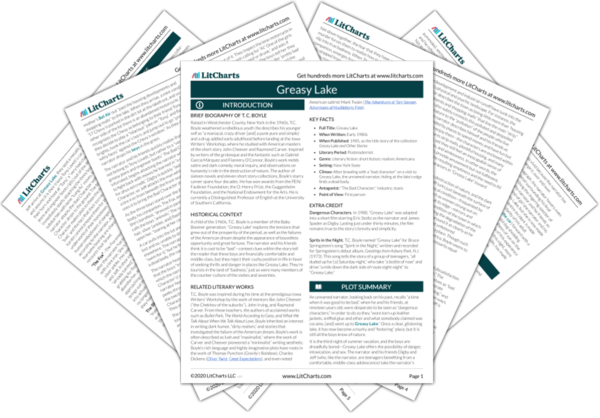Emotional weariness, stagnancy, and dissatisfaction plague the characters of “Greasy Lake.” The narrator and his friends present themselves as “bad characters” who prize indifference. They “strike elaborate poses to show that [they don’t] give a shit about anything,” and they are each completely passive individuals in their own ways. Digby “allow[s] his father to pay his tuition at Cornell;” Jeff is aimless, only “thinking” about opening up a shop; and the narrator describes himself and his friends as being lethally bored and desperate for “action.” On the night the story takes place, the three of them have been out driving around for some time already, having “cruised the strip sixty-seven times, been in and out of every bar [they] could think of, stopped twice for bucket chicken” before they declare that “there [is] nothing to do but [go] up to Greasy Lake.” It is the inescapable “inaction” of their lives, then, that pushes them to Greasy Lake and to the violence that occurs there.
While the narrator feigns indifference, he also fetishizes action. Of brawling with the Bad Character, the narrator recalls that “there was no reasoning with this bad greasy character—clearly he was a man of action.” The narrator, even as he’s being pummeled, seems to admire the Bad Character’s ability to act, and he refers to the blows the Bad Character strikes against him in almost loving terms, as “lusty Rockette kick[s]” and “whistling roundhouse blow[s.]” There is an implication here that the Bad Character is who the narrator and his friends want to be. Not only is the Bad Character bad, but he is committed to action—whereas the narrator and his friends can’t even make up their minds about what to do on a Saturday night.
At the same time, the narrator’s description of the Bad Character as a “man of action” is clearly meant to be ironic (or at least it’s ironic from the point of view of the adult narrator, not the teen version of him present during the events of the story). The sheer ridiculous brutality of what the Bad Character does in retaliation for a mistaken teenage prank clearly indicates that there is no honor or glory in simply being a man of action—the content of that action matters. Further, the Bad Character—despite his willingness to “act”—is clearly headed toward a dead end in life, symbolized by the body. The story, then, portrays inaction, wrongheaded action, and “badness” as being inextricably linked. Notably, no characters in the story provide examples of “good” actions, which seems echoed in Boyle’s descriptions of the town. Greasy Lake has been allowed to fall into deep and despoiled disrepair, and that disrepair represents the entire town’s stagnancy. In such a place, where the “bad” actions of pollution and environmental destruction have been meant with indifference, good action seems not only pointless but beyond comprehension entirely.
Action vs. Inaction ThemeTracker

Action vs. Inaction Quotes in Greasy Lake
There was a time when courtesy and winning ways went out of style, when it was good to be bad, when you cultivated decadence like a taste. We were all dangerous characters then. We wore torn-up leather jackets, slouched around with toothpicks in our mouths, sniffed glue and ether and what somebody claimed was cocaine. We were nineteen. We were bad. We struck elaborate poses to show that we didn’t give a shit about anything. At night, we went up to Greasy Lake.
Through the center of town, up the strip, past the housing developments and shopping malls: that was the way out to Greasy Lake. The Indians had called it Wakan, a reference to the clarity of its waters. Now it was fetid and murky, the mud banks glittering with broken glass and strewn with beer cans and the charred remains of bonfires. There was a single ravaged island a hundred yards from shore. We went up to the lake because everyone went there, because we wanted to snuff the scent of possibility on the breeze, watch a girl take off her clothes and plunge into the festering murk, drink beer, smoke pot, howl at the stars…This was nature.
It was early June, the third night of summer vacation. The first two nights we’d been out [driving around] till dawn, looking for something we never found.
There was no reasoning with this bad greasy character—clearly he was a man of action.
A single second, big as a zeppelin, floated by. We were standing over him in a circle, gritting our teeth, jerking our necks. No one said anything. Already [I was] envisioning the headlines, the pitted faces of the police inquisitors, the gleam of handcuffs, clank of bars, the big black shadows rising from the back of the cell.
We were bad characters, and we were scared and hot and three steps over the line—anything could have happened.
“Hey, you guys look like some pretty bad characters—been fightin’, huh?”
I looked back. The girl was still standing there, watching us, her shoulders slumped, hand outstretched.











